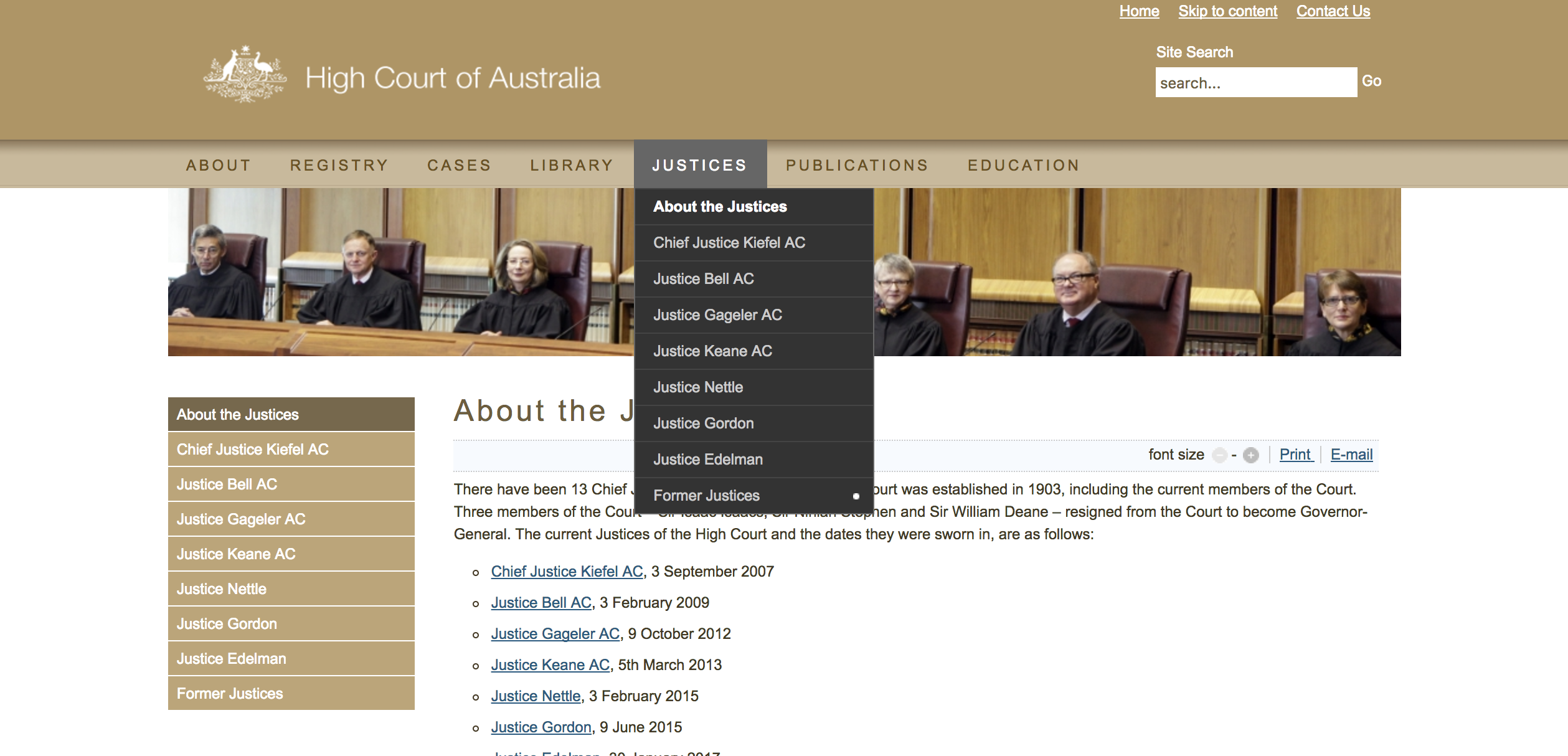By Jeremy Gans
Re Culleton [No 2] Case Page
‘What did you mean,’ he inquired slowly, ‘when you said we couldn’t punish you?’ ‘When, sir?’ ‘I’m asking the questions. You’re answering them.’
No-one cares about Re Culleton [No 2] [2017] HCA 4. Not Rod Culleton, who is out of the Senate regardless, thanks to his bankruptcy problems. Not political types, because the One Nation candidate’s spot will just be taken by another one. Not anyone else, because no-one much likes the ex-Senator (or never Senator or whatever he is — was? — now) or cares who’s who in One Nation. And, it seems, not the High Court either, which last week phoned in a judgment in the case.
This indifference is a bit of a pity. Re Culleton [No 2] raises lots of issues that have nothing to do with Culleton and a number that have nothing to do with elections — and the High Court’s judgment fluffs several of them. Re Culleton [No 2] is a fine example of much that is wrong with Australia’s apex court these days.
‘I didn’t say you couldn’t punish me, sir.’ ‘When?’ asked the colonel. ‘When what, sir?’ ‘Now you’re asking me questions again.’
Every Australian’s right to be elected to Parliament (and to cast a valid vote for their preferred candidate) is limited by the following text:
44 Any person who:
(i) is under any acknowledgment of allegiance, obedience, or adherence to a foreign power, or is a subject or a citizen or entitled to the rights or privileges of a subject or a citizen of a foreign power; or
(ii) is attainted of treason, or has been convicted and is under sentence, or subject to be sentenced, for any offence punishable under the law of the Commonwealth or of a State by imprisonment for one year or longer; or
(iii) is an undischarged bankrupt or insolvent; or
(iv) holds any office of profit under the Crown, or any pension payable during the pleasure of the Crown out of any of the revenues of the Commonwealth; or
(v) has any direct or indirect pecuniary interest in any agreement with the Public Service of the Commonwealth otherwise than as a member and in common with the other members of an incorporated company consisting of more than twenty-five persons;
shall be incapable of being chosen or of sitting as a senator or a member of the House of Representatives.
Section 44 of the Constitution is well meant, but has mostly silly effects. Para (i) forces all dual citizens who want to stand for election to first give up their non-Australian citizenship forever. Para (iv) likely forces all public servants (including all teachers) to quit (and not just take leave from) their jobs if they just want to try to become an MP. Para (v) is basically incomprehensible (and might invalidate the election of many investors, depending on how the High Court rules in Re Day [No 2].) Para (iii), the best of a bad bunch, still makes it risky for anyone to combine running a business with being a politician (as both Rod Culleton and Bob Day exemplify.)
And then there’s para (ii), which keeps Parliament free of (some) criminals. While that certainly sounds like a good idea, Australia’s contemporary criminal law is a good deal broader than most people imagine. The drafters of s 44(ii) wanted to ban people convicted of a ‘felony or any infamous crime’, which in 1900 covered the sort of crimes that could see criminals executed or deprived of all of their property. But Samuel Griffiths, realising that criminal law terms can change or lose their meaning over time, suggested a different test: ‘any offence punishable under the law of the Commonwealth or of a State by imprisonment for one year or longer’. Alas, those replacement words – especially ‘offence punishable’ – are now s 44(ii)’s biggest problem.
‘When didn’t you say we couldn’t punish you? Don’t you understand my question?’ ‘No, sir. I don’t understand.’ ‘You’ve just told us that. Now suppose you answer my question.’
We mainly know criminal ‘offences’ by their shorthand labels — murder, rape, theft, etc — but, under Australian law, offences actually consist of a complex (often very broad) definition and a maximum (often very high) penalty. Lots of offences cover an extremely wide range of behaviour, from absolutely trivial to extremely serious. Assault can be anything from an unwanted tap on the shoulder to a kick in the face. Drug possession can be anything from one banned pill to a truck full of contraband. Criminal damage can be anything from putting up a poster to burning down a house. Child pornography can be anything from a sext on your phone to a hard drive’s worth of horror. And so on. We tolerate these broad definitions (and the accompanying vast maximum penalties) because Australia’s criminal justice system is also full of discretion: prosecutors rarely chose to prosecute trivia and, if they do, judges rarely choose to punish it.
But there is no discretion in s 44(ii). If you have ever done anything trivial that happens to fall within the definition of a serious offence, then you can lose your right to stand for election (and your voters will lose their right to elect you) simply through bad timing, even though you never came within cooee of ‘imprisonment’. All it takes is for someone to charge you with an offence that bundles together whatever trivial thing you did with much more serious behaviour that merits a lengthy stay in prison. That is exactly what happened to Rod Culleton. Continue reading →
